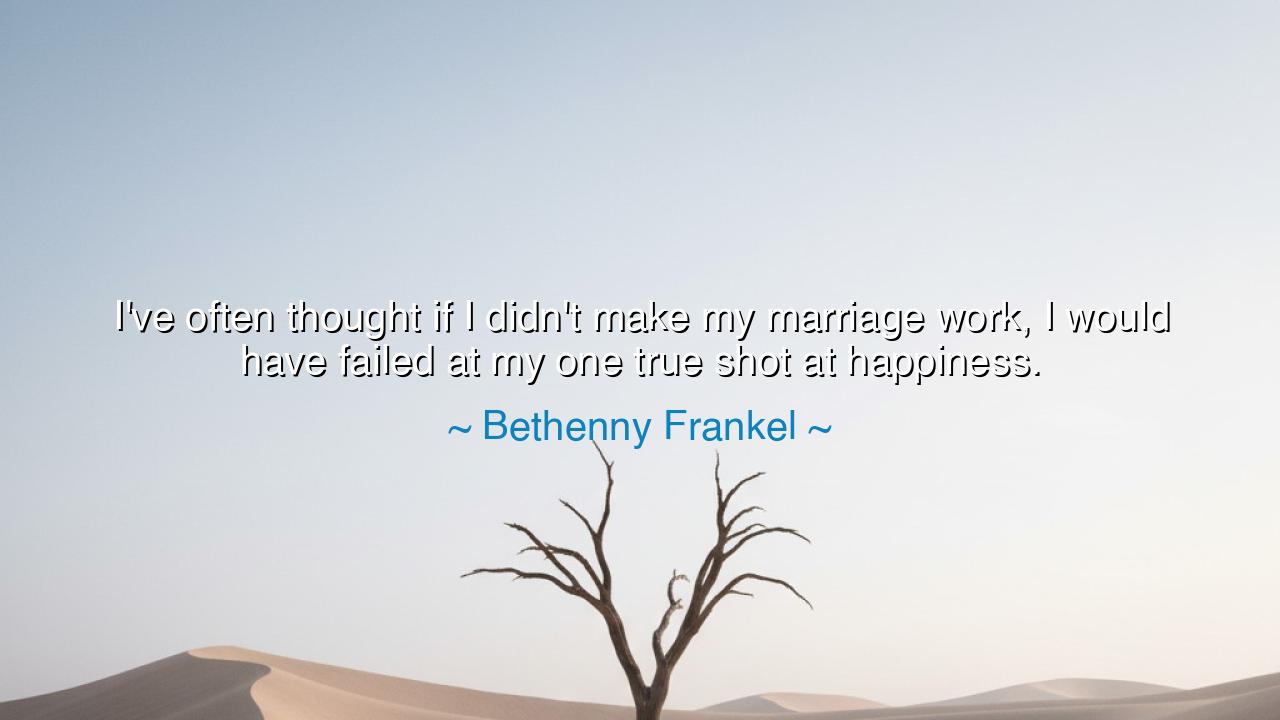
I've often thought if I didn't make my marriage work, I would
I've often thought if I didn't make my marriage work, I would have failed at my one true shot at happiness.






In the quiet ache of confession, Bethenny Frankel once said: “I’ve often thought if I didn’t make my marriage work, I would have failed at my one true shot at happiness.” These words tremble with the weight of many hearts — those who have loved deeply, believed fervently, and tied their sense of purpose to the fragile promise of love. Her reflection speaks not merely of romance, but of the human yearning to make meaning endure. In her voice we hear the echo of countless souls who, throughout the ages, have equated success in love with success in life itself.
To the ancients, marriage was no simple union of two bodies; it was a covenant of souls, a mirror of divine order. It bound not only man and woman, but also the unseen spirits of fate and destiny. To fail in such a union, in the eyes of many, was to lose one’s place in the great design. And yet, what Bethenny Frankel reveals is not just the burden of societal expectation, but the deeper sorrow of self-expectation — the belief that happiness rests upon one fragile branch, and if it breaks, the soul must fall. Her words uncover the tender illusion that we often weave around love: that it alone is the doorway to wholeness.
Think of Cleopatra, queen of Egypt, whose heart blazed with the fire of love and ambition. Her union with Mark Antony was not merely romantic but world-defining — two empires joined by desire and destiny. Yet when that love collapsed under the weight of politics and pride, Cleopatra believed her world had ended. She, too, felt that she had failed her one true chance at happiness, and in despair, she chose death over the emptiness that remained. Her tragedy stands as an eternal reminder: when we entwine our entire sense of worth with another soul, we risk losing the power to stand alone.
And yet, from the ruins of such sorrow, wisdom arises. For love, though sacred, was never meant to be our only source of joy. The divine spark within each person is a flame that must be tended even when companionship fades. Bethenny’s reflection, though born of pain, carries a truth she perhaps later came to see: that the failure of one relationship does not mean the failure of one’s destiny. It is a chapter, not the whole story. Every ending, however bitter, becomes the soil in which deeper self-understanding may grow.
We must learn, as the ancients taught, that true happiness is not given — it is cultivated. The philosopher Epictetus once wrote that the key to freedom lies in mastering what lies within our power, and surrendering what lies beyond it. Love, though beautiful, cannot be controlled; it is a meeting of wills, not a possession. If it falters, we must not measure our worth by its endurance, but by our courage to love again — and more wisely.
To those who hear Bethenny’s lament, let it awaken compassion, not pity. Let it remind you that failure is not the absence of love, but the refusal to learn from it. There is honor in trying, and even greater nobility in healing. When the heart is shattered, do not seek to glue it back to what was lost; instead, let the cracks be filled with wisdom, with faith, with the gold of experience — like the ancient Japanese art of kintsugi, which repairs broken pottery with gold, making it more beautiful than before.
And so, dear listener, remember this: happiness does not come from one person, one promise, or one perfect union. It blooms from the garden of your soul, watered by the tears you have shed and the lessons you have lived. Cherish love, but never make it your prison. Honor commitment, but never lose yourself within it. Should love end, let it end with gratitude, not despair. Rise from its ashes, for the gods favor those who learn, endure, and love anew.
Thus, the teaching concludes: your one true shot at happiness lies not in another’s arms, but in your own awakening. Love fully, but remember always — the heart that can love itself will never truly fail.






AAdministratorAdministrator
Welcome, honored guests. Please leave a comment, we will respond soon